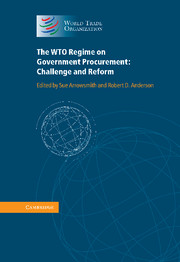Book contents
- Frontmatter
- Contents
- List of contributors
- Foreword by Pascal Lamy
- Perspective of the Chairman of the WTO Committee on Government Procurement, Nicholas Niggli (Switzerland)
- Preface
- Disclaimer
- PART I The WTO regime on government procurement
- PART II Expanding the scope of the Agreement on Government Procurement: accession and coverage
- PART III Revision of the procedural rules and other transparency provisions of the Agreement on Government Procurement
- PART IV Developing countries in the WTO procurement regime
- 11 Special and differential treatment and other special measures for developing countries under the Agreement on Government Procurement: the current text and new provisions
- 12 Building sustainable capacity in public procurement
- 13 Untying aid through the Agreement on Government Procurement: a means to encourage developing countries' accession to the Agreement and to improve aid effectiveness?
- PART V Economic and social development (horizontal policies) in government procurement
- PART VI Enforcement and remedies
- PART VII Multilateralism and regionalism
- PART VIII Challenges and new directions
- Index
- References
13 - Untying aid through the Agreement on Government Procurement: a means to encourage developing countries' accession to the Agreement and to improve aid effectiveness?
from PART IV - Developing countries in the WTO procurement regime
Published online by Cambridge University Press: 07 September 2011
- Frontmatter
- Contents
- List of contributors
- Foreword by Pascal Lamy
- Perspective of the Chairman of the WTO Committee on Government Procurement, Nicholas Niggli (Switzerland)
- Preface
- Disclaimer
- PART I The WTO regime on government procurement
- PART II Expanding the scope of the Agreement on Government Procurement: accession and coverage
- PART III Revision of the procedural rules and other transparency provisions of the Agreement on Government Procurement
- PART IV Developing countries in the WTO procurement regime
- 11 Special and differential treatment and other special measures for developing countries under the Agreement on Government Procurement: the current text and new provisions
- 12 Building sustainable capacity in public procurement
- 13 Untying aid through the Agreement on Government Procurement: a means to encourage developing countries' accession to the Agreement and to improve aid effectiveness?
- PART V Economic and social development (horizontal policies) in government procurement
- PART VI Enforcement and remedies
- PART VII Multilateralism and regionalism
- PART VIII Challenges and new directions
- Index
- References
Summary
Introduction
This chapter examines the compatibility of tied aid (i.e. aid granted on condition that goods and services for the aid-financed project are purchased from the donor country only) with the Agreement on Government Procurement (GPA), and investigates whether inserting untied aid commitments within the GPA coverage could favour developing countries' accession to the GPA while enhancing the development character of the GPA itself and the success and coherence of donors' development aid policies.
The chapter develops previous analysis by La Chimia and Arrowsmith on the compatibility of tied aid with the WTO legal framework. However, while La Chimia and Arrowsmith analysed the GATT, the Subsidies Agreement and the GPA, and limited their analysis to non-agricultural aid goods (i.e. excluding food aid), this chapter focuses solely on the GPA and includes the investigation of topical issues not addressed before, such as the study of food aid procurement and the assessment of whether donors' aid agencies based in and operating from the recipient country are bound to apply the GPA. This chapter also considers the link between procurement and development, highlighting how efficient development aid procurement could help achieve social and economic goals.
Ultimately, this analysis has a threefold aim, namely developing a tout court view of GPA Parties' approach to development procurement and tied aid; assessing the role that the GPA could play in this important but understudied sector; and offering clues on the opportunity for developing countries to participate in an international procurement agreement aimed at opening up trade.
- Type
- Chapter
- Information
- The WTO Regime on Government ProcurementChallenge and Reform, pp. 390 - 426Publisher: Cambridge University PressPrint publication year: 2011
References
- 1
- Cited by



